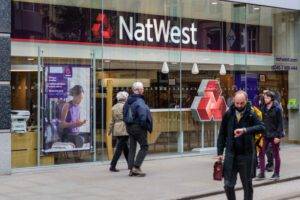
Consumer confidence is on the rise in the UK, with a hopeful outlook towards financial prospects emerging for the first time in two years, according to NatWest.
Paul Thwaite, the bank’s chief executive, noted that the alleviation of price pressures, as inflation gradually recedes, appears to be resonating with the general public. While headline consumer price inflation remains above the Bank of England’s 2% target at 3.2%, it has significantly declined from its peak of 11.1% in October 2022. NatWest’s economic forecast suggests a further reduction to 2.5% by year-end.
“As inflation continues to decrease, and with expectations of the Bank of England commencing rate cuts later this year, individuals and families are expressing greater confidence in their financial circumstances,” Thwaite stated on Friday morning. “For the first time since August 2021, a majority of consumers anticipate an improvement in their financial position over the next 12 months.”
Thwaite emphasized that these insights were gleaned from both internal and external surveys monitored by banking executives.
Despite lingering uncertainty surrounding the UK’s economic trajectory, NatWest remains cautiously optimistic. With no notably bleak forecasts in sight, the banking group is bolstered in its confidence that the majority of customers will uphold their loan repayment obligations.
During the first quarter, NatWest allocated £93 million to safeguard against potential borrower defaults, a notable increase from £70 million in the same period of 2022 but lower than the £191 million anticipated by analysts.
“While diverse perspectives exist, and actual outcomes may diverge, particularly amidst significant macroeconomic uncertainty both domestically and internationally, customers continue to demonstrate resilience, and impairments remain minimal,” Thwaite remarked.
NatWest’s shares soared by 4.6% on Friday to reach a 14-month high of 303p per share. This surge propelled NatWest to the top of the FTSE 100 risers, contributing to the index’s attainment of a new all-time high of 8,136.52 points during early trading.
Despite a 27% decline in pre-tax profits to £1.3 billion in the three months to March, NatWest’s performance is notable, especially given the challenging comparison with a 50% profit surge to £1.8 billion during the same period last year, spurred by a series of interest rate hikes by the Bank of England.
Thwaite attributed this to NatWest’s commitment to offering competitive interest rates to savers amidst stiff competition in the mortgage market, coinciding with a slowdown in the housing market.
NatWest also confirmed a reduction in the taxpayer’s stake in the bank, from 28.9% to 27.9%, following the government’s sale of another tranche of shares ahead of Friday’s results. The government aims to further divest its stake to the public this summer, with the aspiration of fully exiting its ownership by 2025-26.
Thwaite, formally appointed chief executive in February, succeeded Alison Rose on an interim basis in July, following her departure amidst a dispute with Nigel Farage. Thwaite previously led NatWest’s business banking division.
Read more:
UK Consumers Regain Financial Confidence Amid Easing Inflation, Reveals NatWest CEO







